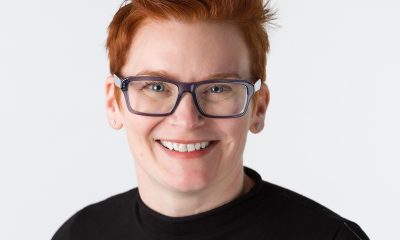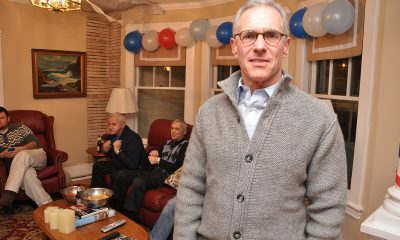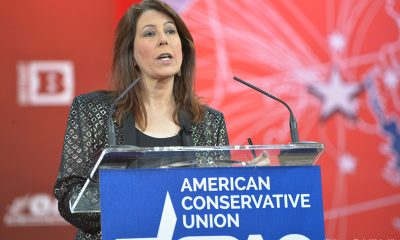Opinions
Sean James: From NFL running back to elite model
Career transition opened my world to new people, ideas

By SEAN JAMES
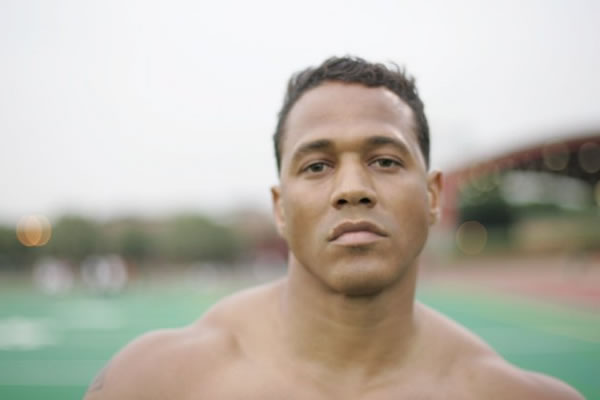
Sean James (Photo courtesy of Sean James)
So what makes a small town boy turned professional athlete who has spent the first 20 odd years of his life steeped in football culture ready to enter the New York fashion and modeling scene? Absolutely nothing!
Being in a country as large as ours can still be very isolating. Outside the big city streets are many small towns where diversity is still not a norm. Unfortunately from big cities like New York where we have a little bit of everything (and I do mean everything), to the small farm towns of Middle America, prejudice still exists. Much of it however, is rooted in ignorance. People are afraid of what they do not know, and what they do not understand.
FIND MORE OF THE WASHINGTON BLADE SPORTS ISSUE HERE.
Moreover, others are so unaware of their own ignorance that their prejudice is truly unintentional. Growing up in a small town in Kansas, even I fell victim to my ignorance. It was not until I moved to New York that I knowingly had any contact with a many minorities. Jewish people and gays (who now comprise a large portion of my peers) were completely foreign to me. Not only had I never met any, but I didn’t know anything about them either. That disassociation made it easy for me to throw around words like “faggot” with my friends.
I wasn’t intentionally making an anti-gay remark, in my mind I was simply calling out an insult to a friend or teammate no different than calling him an idiot. I never stopped to think about what the word “faggot” actually meant, or why it was used derogatorily. There was no one in my circle of peers or adults to guide me, talk to me, or educate me about what lay outside the borders of our town and our own experiences. By remaining ignorant about the diverse groups that comprise our nation, I was guilty, as are so many others of allowing myself to remain prejudiced.
Becoming a professional athlete was my end goal for as long as I could remember, and it was something that I strived to achieve through hard work and discipline for the majority of my life. Becoming a Ford model for one of the top agencies in the world on the other hand, kind of fell into my lap when I moved to New York. I had no experience with the modeling world, and no knowledge of how it worked or whom I would encounter. Spending time in the fashion world of New York introduced me to a world of new people, including photographers, designers and stylists, not to mention other models. Suddenly, I was immersed in a game that had new rules and new players.
In the NFL, the players were predictable (at least off the field), and so were the rules. It was a game of strength, machismo and competition. Every player knew their role in a locker room as much as they knew their role in a game. Be tough, talk shit, joke around — but get shit done. Some of that joking around came at the expense of the LGBT community. It didn’t occur to us that we were being offensive, let alone that there may have been a gay man on our team, in that locker room with us, or worse yet, laughing at those jokes out of fear. That was my conditioning, my everyday. Then I became a Ford model, and let’s just say the locker room looked very different. I was the minority in almost every sense of the word. I was a minority as a black man, I was a minority as a muscular man with an 18-inch neck, and I was a minority as a straight man.
Everything that made me one of the boys in football now made me an outsider. So I had a choice: I could stride into this new world as the same running back who strode into stadiums, or I could do what my daddy taught me and put my head down, stay in my lane and listen. I chose to do the latter. I listened and I watched. I paid attention to how people spoke, how they interacted with each other. I also began to see how gay men responded to me, especially the gay men who were in a position to advance my career.
I am not suggesting that every gay man in the industry hit on me, or that every gay agent, designer, etc. had a casting couch. What I am saying, however, is that there were some, and that was a reality that I had never seen before, and one to which I had to quickly acclimate. The more people I met, the more I gained a window into the gay world, and as my window widened, the stereotypes I had grown up listening to began to break down. The most significant example of this for me was the introduction I was given to the New York Times best-selling author, and my friend, E. Lynn Harris.
I was introduced to E. Lynn through Lloyd Boston who thought I’d be the perfect choice for one of E. Lynn’s book covers. The result of that introduction was much more than a booking, it was the beginning of one of the closest and most significant friendships of my life. From the time I met him until his death, E. Lynn taught me many valuable lessons. As a gay man himself, E. Lynn shattered whatever stereotypes of gay men that I may have had lingering from my adolescence. From the way he lived his life, to the way he spoke to me, to the way he crafted his novels, E. Lynn turned the “typical” idea of a gay man on its head.
He explained to me the way he grew up in the South and how he was taught that being gay was a choice and was wrong, and how that mentality led him to perceive himself as a sinner. He explained that he was in the closet through high school, but becoming a writer freed him and allowed him to be himself. Being himself meant many things to E. Lynn. It meant being a huge football fan, being the first black male cheerleader at the University of Arkansas, being masculine and liking men who were masculine too (“If I liked girls, I’d fuck girls”, he would always say). It meant being a best-selling author who could engage and captivate readers whether they were male or female, gay or straight.
Still in all, for E. Lynn being himself also meant that even though he was “out”, he was still afraid of being perceived as a queen. This was a sentiment that was surprisingly easy for me to understand. As a professional athlete, I was always well aware of the perceptions people had of me. I was always conscience of avoiding the “dumb jock” presumption when meeting new people. The fear of how others would perceive me had absolutely no baring on the pride I took in being an athlete, just as E. Lynn’s fears had no bearing in the pride that he took in being gay. However, our pride was never able to mask the realities we knew existed all around us.
Looking back at my experiences both as an NFL player and a Ford model, I see how impactful perceptions can be, but more importantly how inaccurate perceptions can affect a person or a group of people. Over the past 50 years, this country has made great strides toward breaking down the stereotypes and negative perceptions many of us held about various minority groups. President Barack Obama serves as a testament to those strides. Progress, however, does not exist in a vacuum, and the dream of equality has expanded to meet the ever-changing portrait of the American people. During the Civil Rights Movement, African Americans fought for their constitutional rights. The assertion that the color of skin with which you were born does not change your rights as a citizen of this nation stood at the foundation of that fight.
Today, sexual orientation, just like skin color, is something of which to be proud, and yet, something in which you have no hand. I am grateful that I was able to encounter strong, incredible individuals along my journey from professional athlete, to model, to the business man I am today that were able to positively mold my perception of the gay community. This is why I continue to support the LGBT community and those who are working to afford it the rights and perceptions that it deserves.
Sean James is a sports agent, Ford model and former running back for the Minnesota Vikings. Reach him via seanlewisjames.com.
Opinions
Tammy Bruce, Trump’s lesbian nominee for deputy UN ambassador. Just say no!
Senate Foreign Affairs Committee advanced former State Department spokesperson’s nomination this week

One evening In the late 1990’s, I drove over to the home of my late friend, Jim Hormel, to review a number of countries to which he was being considered by the Clinton administration to serve as our country’s first openly gay ambassador. It was a very big deal. Secretary Madeleine Albright would eventually swear him in during a teary-eyed ceremony, but only after a recess appointment in order to avoid an ugly, partisan fight in the Senate over Jim’s sexuality.
Fast-forward to today, and our country has had over 30 openly gay male ambassadors — both career diplomats and political appointees — and one, single lesbian at an ambassador-ranked position at the Asian Development Bank, Chantale Wong. (Ambassador Wong is also one of only two people of color among the openly gay or lesbian ambassadors.) I am very proud to have helped convince Amb. Wong to come out of retirement to take on that important role, because the time was right for someone with her passion, experience, and commitment to push for inclusive development policies at a major international financial institution. In fact, she had occupied the position once before as acting executive director of the ADB under the George W. Bush administration, and used that expertise to successfully champion an inclusive development policy that explicitly names sexual orientation and gender identity as a non-discrimination category, as well as other programs that benefit community members. But getting through the Senate confirmation process was not an easy task before this second Trump administration, especially for those without the resources or connections to deploy their own personal lobbyists, even when the candidate was superbly qualified.
So, a few months ago, when I read that Tammy Bruce was nominated by President Trump to be one of our ambassadors to the United Nations, I choked on my coffee. I couldn’t believe that our second ever openly lesbian ambassador would be a far-right, anti-trans, anti-Muslim, Trump loyalist. But, maybe the choice was not so surprising after all, which then says a lot about the Biden administration’s priorities. Trump was also the president who made good on the Human Rights Campaign’s longtime push for an openly gay G7 ambassador, with the appointment of another far right, anti-Muslim, gay ambassador, Richard Grenell to Germany. These two people alone should convince any sane human why identity-politics alone has severe limits.
After 16 years of submitting short lists of qualified lesbian-identified and trans-identified candidates to the White House Office of Personnel Management to be considered for appointed ambassador positions, and also simultaneously trying to support senior, career diplomats who are lesbian or trans to advance in their careers, I was particularly frustrated and enraged. While I believe it’s time to move beyond identity politics, I also deeply believe that diverse representation matters. Not tokenization (and not donor-purchased ambassadorships) but exceptionally well-qualified, diverse American people, who represent the actual plurality of our nation, which makes us stronger. The foreign affairs arena, in particular, is overly white and male dominated. Think what you may about “DEI,” but a diplomatic corps that doesn’t reflect the diversity of our nation doesn’t make our country stronger — it actually makes us less globally relevant and decreases our understanding of this rapidly changing, multi-polar world.
The 34:1 ratio of gay men to lesbians among our nation’s openly queer ambassadors that exists today is infuriating to me as a woman, a feminist, a lesbian, and as a human rights leader. And yet, the nomination of Tammy Bruce, infuriates me even more. She is an extremist ideologue who uses her platform for hate.
Bruce’s hate centers on her anti-Muslim extremism. According to CNN’s Andrew Kaczynski and Em Steck, “Trump’s pick for deputy UN job questioned [the] loyalty of American Muslims … (Bruce) for years promoted inflammatory, anti-Muslim and conspiratorial claims, including suggesting that former President Barack Obama was a secret Muslim bent on harming America. A CNN KFile review of Bruce’s blog posts, social media posts, columns and radio commentaries starting in the early 2000s shows a pattern of demeaning language about Muslims, including suggesting that American Muslims needed to prove their loyalty after the Sept. 11, 2001, terrorist attacks … Bruce didn’t respond for comment.”
When nominating Bruce, Trump said, “after being a liberal activist in the 1990s, (Bruce) saw the lies and fraud of the Radical Left, and quickly became one of the strongest Conservative voices on Radio and Television.” Bruce wrote the book “The New Thought Police,” aiming to “expose the dangerous rise of left-wing McCarthyism.” In addition to poking fun at feminists, anti-racists, and progressives, she has particularly promoted misguided anti-trans ideology, such as championing the cause of Chloe Cole, a “detransitioner” who had top surgery at age 17. Bruce uses this outlier case to justify legislation to ban trans health care in the United States.
The extremist right loves to scapegoat trans people and their right to appropriate, life-saving health care. Confirming Ms. Bruce for this role as a U.S. representative at the United Nations, with all of her whacky and fringe ideology, is incredibly dangerous for U.S. citizens and for others throughout the world. The person who represents the United States at the United Nations must be able to talk to every other country representative, in order to be effective. Ms. Bruce will be viewed with suspicion and avoided because of her past statements and views. Again, such extremism has no place in our government or representing our country. In her confirmation hearing, Ms. Bruce called President Trump’s leadership at the United Nations “inspirational.” She refused to call the massacre in Sudan a genocide. She didn’t seem to understand what leverage the U.S. might have with the UAE to stop arming this genocide. She deferred multiple times to serving this President in whatever foreign policy aims he has. In this era of increasing authoritarianism, we do not need more obsequious servants to King Trump. Now that Ms. Bruce has been voted out of committee, this proud lesbian, respectfully requests all U.S. Senators to not confirm Ms. Bruce for U.S. Deputy Ambassador to the United Nations.
Julie Dorf is co-chair of the Council for Global Equality.
Opinions
Victory Fund continues to shun me and my place in LGBTQ history
Before Buttigieg, my presidential campaign made headlines
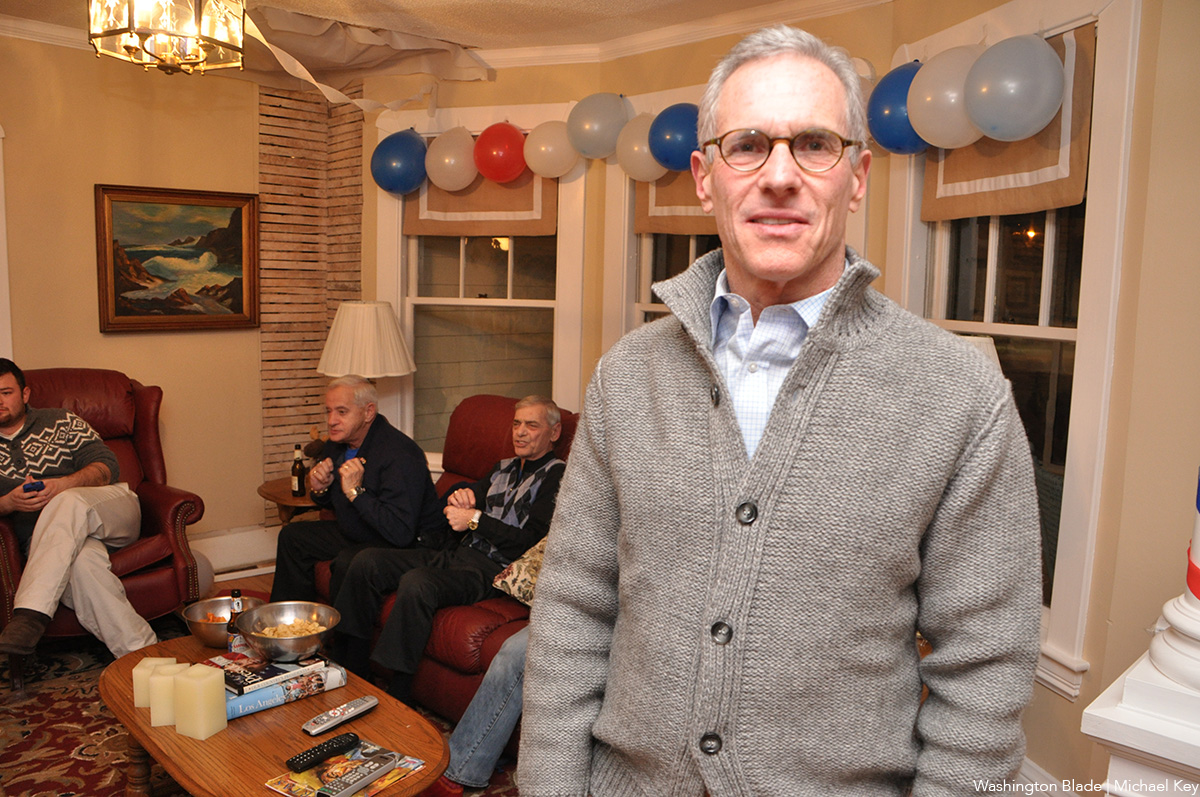
I am honored to be speaking this weekend at the National Council for the Social Studies Annual Conference (NCSS), made up of 5,000 teachers from across the county. I will be talking about my history-making campaign for president back in 2012, when I ran as the first openly gay major party candidate to do so.
I will be joining many other prominent featured speakers, including Supreme Court Justice Ketanji Brown Jackson, Washington, D.C. Episcopal Bishop Mariann Edgar Budde, Dr. Richard Haas, and House Minority Leader Hakeem Jeffries. This engagement was arranged by the prestigious History UnErased, and I will talk about my roller coaster run for president
It was a hard-fought, two-and-a-half year, full-time campaign in the Republican primaries. I appeared on six state ballots, gave hundreds of speeches, did thousands of media interviews and attracted thousands of volunteers, donors, and voters. In fact, when the primaries ended, I had received more votes than two former governors, Jon Huntsman, Jr. (Utah) and Gary Johnson (New Mexico).
My constant message to the LGBTQ community was, you can do anything you want to do in life, even run for president of the United States. I heard from so many people young and old that I was giving them newfound hope.
Eight years later, when openly gay Mayor Pete Buttigieg ran for president, I endorsed him in February 2019, served on his National Finance Committee, and did a lot of surrogate work on his behalf. We developed a strong bond, being the only two openly gay candidates to ever run for president. He told me, “You’re a trailblazer who made it a little easier for those who follow your path.”
I applied pressure on many of the nation’s largest LGBTQ organizations to endorse Pete early, when it would make a difference. I wrote op-eds in Newsweek and the Advocate urging the LGBTQ Victory Fund, HRC, The Task Force and many others to support Pete. Eventually the reluctant Victory Fund came around and endorsed Pete at a big splashy campaign event in Brooklyn on June 28, 2019 during WorldPride.
That early support from the nation’s sole organization to help propel openly LGBTQ candidates to victory, made a huge difference in Pete’s success.
I was not as fortunate. One of the first meetings I had was with Chuck Wolfe, the then head of the Victory Fund in January 2010. He blurted out, “we’re not going to help you!” And true to his word, they actually worked to hinder my historic run. They made me submit a number of applications including a 56-page campaign plan and budget. Several months after delivering it, Chuck told me they would not even put my endorsement to a vote. “You don’t want to know,” he told me. “Yes, I do,” I replied.
I have met with or spoken to all of his successors at the Victory Fund, offering my help and asking for some sort of recognition of my historic campaign. Finally in 2018, after a lot of negotiations, then-President Annise Parker gave me one sentence in their Under Our History section on their website.
I have been an LGBTQ activist and major donor since I worked closely with David Mixner to defeat the Briggs Initiative in 1978, which would have outlawed gay teachers in California. I spent 30 years as a political consultant. Since 2008, I became the only one, through my organization Californians Against Hate, to fight back against the mega donors to California’s Proposition 8 and other anti-same-sex marriage campaigns.
I shamed millionaires and billionaires and even the all-powerful Mormon Church, who funded and ran all these hateful campaigns. The New York Times published a full page column three years ago on all I did to help gay marriage become the law of the land, “Cancel Culture Works. We Wouldn’t Have Marriage Equality Without It.”
So, I’ve earned my stripes. That is why I find it ironic that while I am speaking to the 5,000-member NCSS gathering in Washington, the same weekend that the LGBTQ Victory Fund is holding its annual Victory Institute gathering a few blocks away, while they continue to shun me and my rightful place in history.
Fred Karger is the first openly gay major party candidate to run for president.
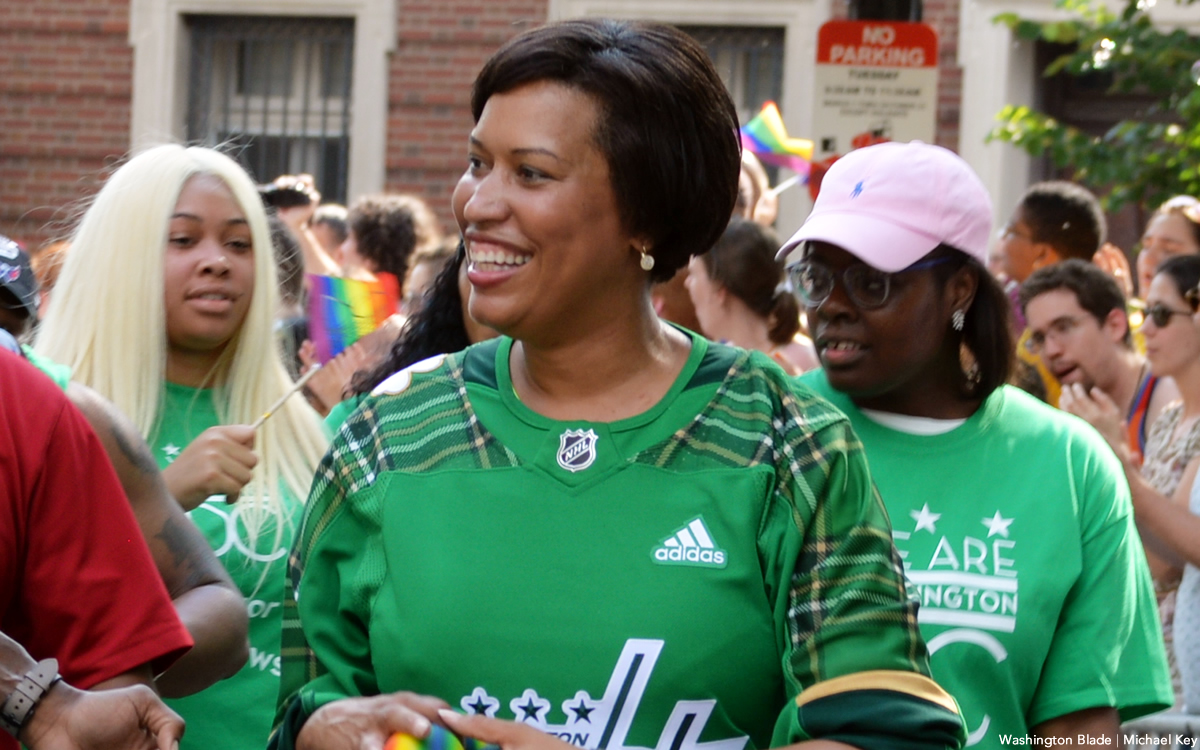
Thank you, Mayor Muriel Bowser, for all you have done for our beautiful city. I am proud to say I have been a supporter of yours since you first announced your run for City Council in Ward 4, when you took some of my suggestions for your first speech. I have known since then what an amazing woman, politician, leader, and now mother, you are. You have moved our city forward in so many ways no one could have anticipated when you were first elected.
You have always proven your mettle, and your ability to rise above the chaos, and done the right thing for all the people of the District. Whether it was during economic uncertainty created by others, the pandemic, the backlash against police after the murder of George Floyd, during the first Trump administration, or the ongoing crisis, continuing today after the felon was elected for a second time. This time, contrary to his first term, he has even more venal people around him. They are acting out their fascist beliefs, and directing him, as he threatens the very basis of home rule. You have stood your ground, and done it with grace and smarts. You managed to work through the budget crisis, and Congress’s attempt to derail all the progress you have made, by not letting us spend a billion dollars of our own money. You have been walking a tightrope, and managing to keep our city from falling into his hands. Not everyone has understood how difficult that has been.
Then you managed to get James Comer (R-Ken.), chair of the House Oversight Committee, to support your efforts to have 180 acres of valuable land, the RFK site, turned over to the District for redevelopment. After that, you achieved your goal of getting the Commanders to agree to move back to D.C.; in the process securing the largest private investment ever for the District, the $3.7 billion the team’s owners agreed to pay to build a new domed stadium. That being only the catalyst for an entire new community with 6,000 units of housing, including affordable housing, a supermarket, hotel, sports complex for students in D.C., parks, nature trails, and more.
While balancing budgets and fighting crime, you have had to deal with the felon in the White House every day. Some accused you of acquiescing to the felon when what you were actually doing was saving our city from the even worse disasters he could visit upon us.
You understood to rebuild the economy Trump and the pandemic worked to destroy, you needed to look at other options. You rightly determined part of what D.C. needed to grow was a sports economy. When Monumental Sports owner Ted Leonsis was trying to move the Capitals and his business out of the District for pure greed; you worked behind the scenes and successfully kept them here. Prior to that you engineered a public/private partnership between the city, and DC United, to get Audi field built.
Then besides sports you have worked with the private sector to begin the work of converting empty office buildings in the downtown area, into apartments, which will generate new needed taxes for the District. You oversaw the reconstruction of the Frederick Douglass Memorial Bridge, and the redevelopment of the South Capitol Street corridor. Along with all this you have overseen the rebuilding of schools, sports fields, recreation centers, and libraries across the city. In the past five years you have added nearly 10,000 affordable housing units in the District, built new shelters for the homeless, and a new hospital in Southeast D.C.
You have fought for fairness and equality for the LGBTQ community. You didn’t just walk in our parades, but worked to make them successful. You added budget money to build a new LGBTQ community center, and money to support WorldPride, while the felon’s policies threatened it in every way. After years of many of us trying to get the city to take responsibility, and fund, the annual High Heel Race, you were the mayor who finally agreed to do it. You have always stood proudly with the LGBTQ community that I am a part of, in large and small ways, both in public and privately.
You now have one more year to serve as mayor, and I can’t wait to see what you will yet accomplish. It will not be an easy time, as we saw the day after you announced you would not run again. You, and we, faced the tragic shooting of the two National Guard members from West Virginia, who walked our streets at the felon’s orders. But I am confident your energy and drive, your smarts, and understanding of people, will allow you to deal with this and won’t let you stop working for us until the minute the next mayor of the District of Columbia is sworn in at noon, Jan. 1, 2027.
It is clear to all of us, that person, he, or she, will have very large shoes to fill. Mayor Bowser, we all owe you a debt of gratitude for all you have done for D.C. I for one look forward to all you will do in the future; in whatever area you choose to work. I know your work is far from done.
Peter Rosenstein is a longtime LGBTQ rights and Democratic Party activist.
-

 Opinions5 days ago
Opinions5 days agoVictory Fund continues to shun me and my place in LGBTQ history
-

 LGBTQ Non-Profit Organizations4 days ago
LGBTQ Non-Profit Organizations4 days agoVictory Institute honors President Biden
-

 Opinions4 days ago
Opinions4 days agoTammy Bruce, Trump’s lesbian nominee for deputy UN ambassador. Just say no!
-

 Maryland4 days ago
Maryland4 days agoFreeState Justice launches 501(c)(4) group





